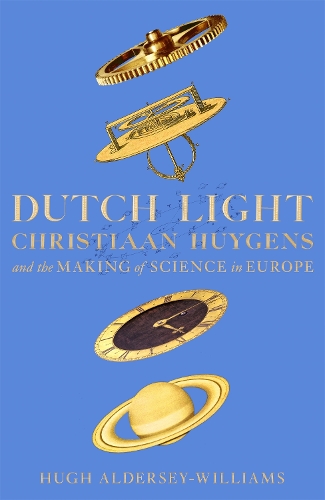
Dutch Light: Christiaan Huygens and the Making of Science in Europe
(Paperback)
Available Formats
Publishing Details
Dutch Light: Christiaan Huygens and the Making of Science in Europe
By (Author) Hugh Aldersey-Williams
Pan Macmillan
Picador
28th December 2020
United Kingdom
Classifications
General
Non Fiction
History of science
Impact of science and technology on society
European history
History of other geographical groupings and regions or specific cultures / socie
500.2092
Physical Properties
Paperback
560
Width 153mm, Height 234mm, Spine 40mm
737g
Description
Filled with incident, discovery, and revelation, Dutch Light is a vivid account of Christiaan Huygens's remarkable life and career, but it is also nothing less than the story of the birth of modern science as we know it. Europe's greatest scientist during the latter half of the seventeenth century, Christiaan Huygens was a true polymath. A towering figure in the fields of astronomy, optics, mechanics, and mathematics, many of his innovations in methodology, optics and timekeeping remain in use to this day. Among his many achievements, he developed the theory of light travelling as a wave, invented the mechanism for the pendulum clock, and discovered the rings of Saturn - via a telescope that he had also invented. A man of fashion and culture, Christiaan came from a family of multi-talented individuals whose circle included not only leading figures of Dutch society, but also artists and philosophers such as Rembrandt, Locke and Descartes. The Huygens family and their contemporaries would become key actors in the Dutch Golden Age, a time of unprecedented intellectual expansion within the Netherlands. Set against a backdrop of worldwide religious and political turmoil, this febrile period was defined by danger, luxury and leisure, but also curiosity, purpose, and tremendous possibility. Following in Huygens's footsteps as he navigates this era while shuttling opportunistically between countries and scientific disciplines, Hugh Aldersey-Williams builds a compelling case to reclaim Huygens from the margins of history and acknowledge him as one of our most important and influential scientific figures.
Reviews
This book, soaked like the Dutch Republic itself 'in ink and paint', is enchanting to the point of escapism . . . One of the best things about this absorbing book (and how many 500-page biographies feel too short when you finish them) is the interest it shows in everyone else. -- Simon Ings * Spectator *
Heres early modern Europe by way of one of its most energetic minds * Times Literary Supplement Books of the Year *
Hugh Aldersey-Williams rescues his subject from Newton's shadow, where he was been unjustly confined for other three hundred years . . . a fresh and absorbing vision of 17th-century experimentation that sheds welcome light on wider European culture. * Literary Review *
A clever and comprehensive portrait of a unique mind prospering on the border between Renaissance humanism and Enlightenment empiricism. -- Chris Allnutt * Financial Times *
Hugh Aldersey-Williams reclaims the 17th-century polymath Christiaan Huygens from relative obscurity in an excellent biography that is also a story about the birth of modern science. Among other things, Huygens invented the mechanism for the pendulum clock and discovered the rings of Saturn through a telescope he had invented. -- Ruth Scurr * Spectator 'Books of the year' *
Fascinating . . . an impressive piece of scholarship. I learned a lot -- John Gribbin, author of Six Impossible Things and In Search of Schrdinger's Cat
At last a scintillating biography of Christiaan Huygens, the Dutch mathematician, astronomer and inventor whose splendour has been unjustly eclipsed by the aura of Isaac Newton. After scouring archives, art galleries and museums in both the Netherlands and the UK, Hugh Aldersley-Williams has evocatively illuminated this brilliant polymath who laid the foundations of modern European science. -- Dr Patricia Fara, Emeritus Fellow of Clare College, Cambridge.
Author Bio
Hugh Aldersey-Williams studied natural sciences at Cambridge. He is the author of Periodic Tales, Anatomies, Tide: The Science and Lore of the Greatest Force on Earth and Dutch Light.
